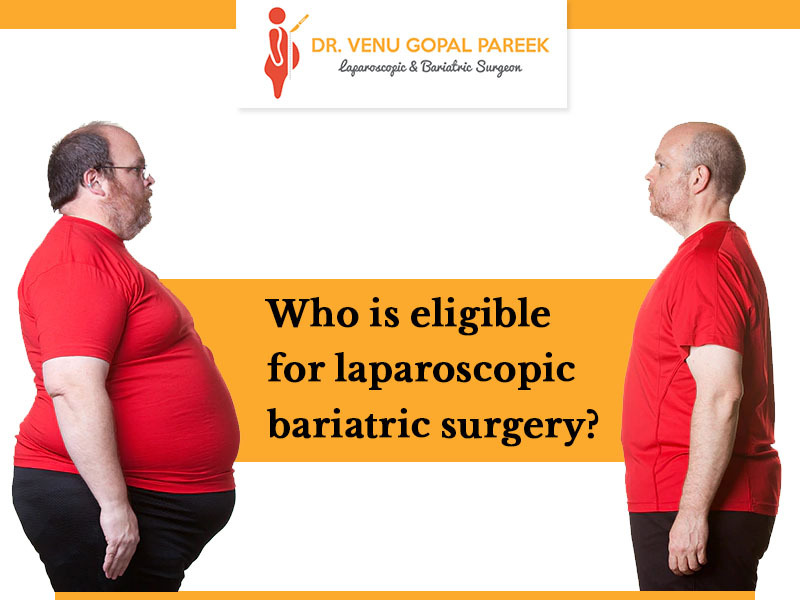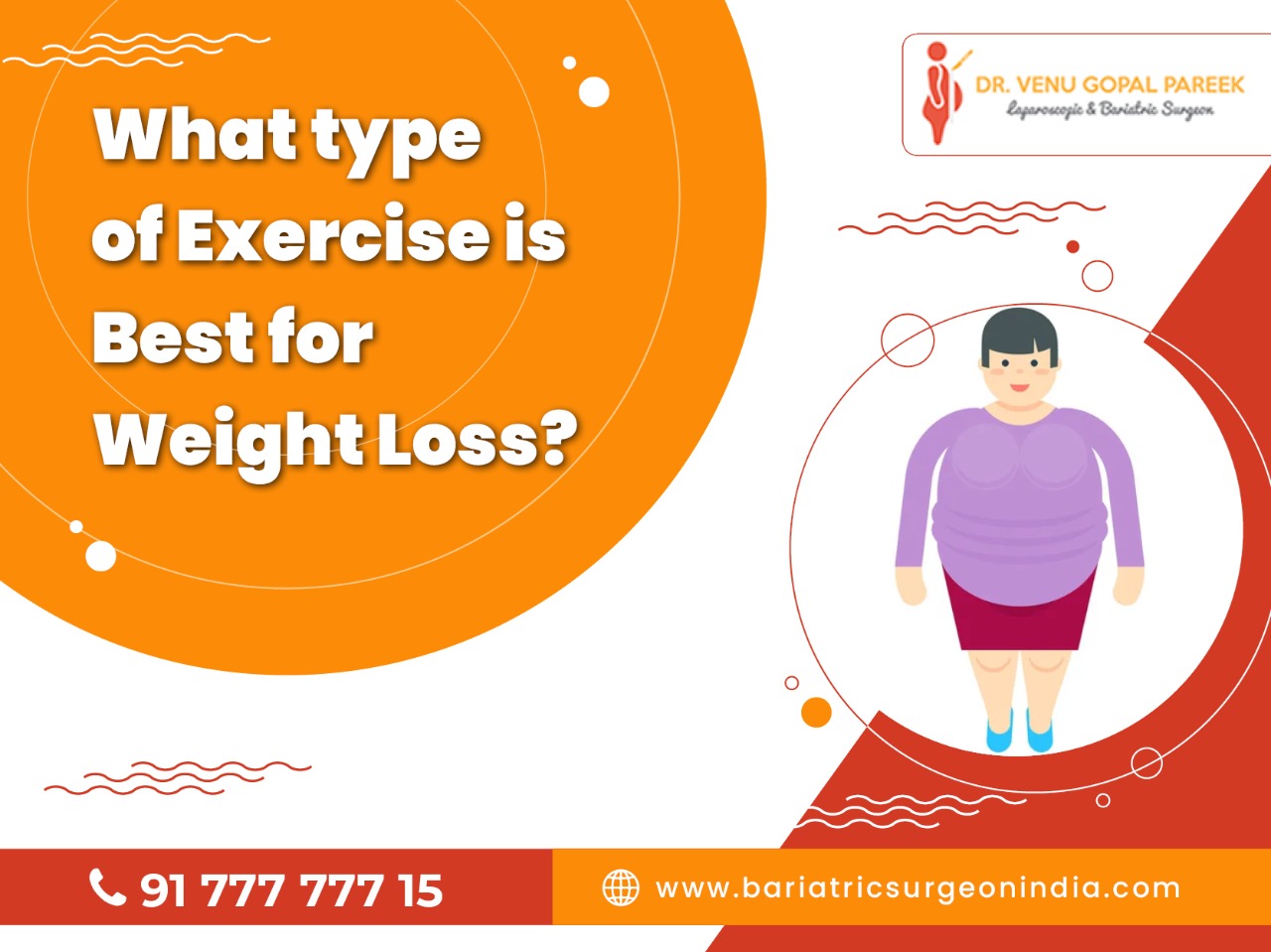
Who Is Eligible For Laparoscopic Bariatric Surgery?
Have you tried and adopted every diet, but you’re still not losing weight. If you are obese, then bariatric surgery might be precisely what your doctor may offer you.
Obesity with a BMI of more than 30 is a severe problem worldwide. Obesity affects 35% of India’s population. This could be due to lifestyle choices or medical conditions. Therefore, proper weight management through exercise and diet is not only essential but also very healthy for you. However, this method doesn’t work for everyone. The bariatric procedure will help you control your weight surgically with the help of a good doctor. This includes medical supervision by well-trained doctors, nutritionists, specialists and advisors.
Dr Venu Gopal Pareek is an experienced doctor dedicated to providing all types of surgical procedures for bariatric management that meet international standards. Two options are available depending on the severity of the case. In some cases, doctors have chosen to use both procedures at safe intervals.
The procedure of Bariatric surgery:-

Reduction of stomach size: There are two ways to do this.
- Using a band to block part of the stomach (Gastric Banding)
- Removing part of the stomach altogether (Sleeve Gastrectomy & biliopancreatic disruption with a duodenal switch ).
Changing the size of the small intestine: A part of the small intestine is divided and transferred and to the stomach. Here the stomach also shrinks, as in the previous step. (Gastric Bypass Surgery). Dr Venu Gopal Pareek uses cutting-edge technology and has vast clinical expertise. He has achieved extraordinary accomplishments that improved the lives of hundreds of patients.
In this article, we discuss as to who is eligible for laparoscopic bariatric surgery. Let us see….
Obesity
If your body mass index is above 27, it is time to act. Obesity is more than just a cosmetic problem. This is a pandemic affecting the world’s population. It is the presence of excess body fat which can cause dangerous diseases and endanger your health.
The higher the BMI, the greater the risk of comorbidities such as type 2 diabetes, high blood pressure, dyslipidemia (high cholesterol), PCOD, infertility, sleep apnea (snoring at night with decreased oxygen saturation), and various types of cancer . Chronic bone pain and joint damage are a direct result of being overweight. Laparoscopic bariatric surgery is an option for severe obesity. What is it!
What is severe obesity:

Severe obesity, sometimes known as “painful obesity”, is defined as around 100% over ideal body weight. This condition is associated with the development of life-threatening complications such as high blood pressure, diabetes, and coronary artery disease.
Many therapeutic approaches to this problem are recommended, including a low-calorie diet, medication, behaviour modification, and exercise. The only treatment proven to be useful as a long-term treatment for morbid obesity is surgery.
Laparoscopic Bariatric surgery helps fight severe obesity:
Bariatric surgery is the most popular and effective option for treating abnormally obese or severe patients with related diseases. This helps them fight obesity and regain the health and lifestyle they deserve.
Bariatric surgery helps with weight loss by changing the body’s ability to digest and absorb food. This can be achieved through a variety of methods. The appropriate procedure for the patient can be decided in consultation with the doctor after reviewing the patient’s medical history and requirements for weight loss.
Laparoscopic Bariatric surgery is one of the safest surgical procedures:

Although there are risks to any surgical procedure, bariatric surgery is one of the safest surgeries. It is considered safer than other elective surgeries.
The vertical sleeve gastrectomy, roux-en-y gastrectomy, and gastric bypass use a laparoscopic approach to reduce complications.
Laparoscopic surgery uses a thin tube called a laparoscope that is inserted through the smallest possible incision in your abdomen. The minimally invasive technique is using a small camera and delicate instruments. This approach has been shown to reduce recovery time, reduce hospital stays, reduce scarring, and reduce postoperative pain.
Dr Venu Gopal Pareek bariatric surgeon also performs most of the weight loss surgeries in Hyderabad with a laparoscopic procedure. He is a skilled surgeon, so is associated with better outcomes and a lower chance of surgical complications.
Laparoscopic Bariatric Surgical treatment:
In the last 40-50 years, several weight-loss procedures were discovered. Operations that are recognized by most surgeons include vertical band gastroplasty, gastric band (adjustable or non-adjustable), Roux-en-Y gastric bypass, and malabsorption procedures (biliopancreatic disorders, duodenal diversion).
In vertical band gastrectomy, a small pouch is created that limits the outlet to the lower abdomen. The exit is reinforced with a piece of band if necessary to avoid disturbance and dilation.
The laparoscopic gastric band consists of placing a 1/2 inch belt or collar around the upper stomach. This creates a small pouch and a sturdy outlet in the lower stomach. The adjustable band, approved by the FDA in June 2001, can be filled with a sterile saline solution. When a saline solution is added, it slows down performance in the stomach, further limiting the food that comes out of the bag.
The gastric bypass procedure involves dividing the stomach and creating a small gastric sac. The new gastric sac connects to various lengths of your small intestine which are built into the Y-shaped limb (Roux-en-Y gastric bypass).
Malabsorption surgery causes weight loss by reducing the absorption of calories from the intestines. This operation includes reducing the size of the stomach and passing a large portion of the intestine.
Choosing between different surgical procedures includes surgeon preference and patient adherence to dietary habits.
Advantages of laparoscopic bariatric surgery:
The benefits of the laparoscopic approach include:
- Reduces postoperative pain
- Length of stay in hospital
- Get back to work faster
- Enhanced Cosmesis
Who Should Consider Laparoscopic Surgery?

The National Institutes of Health have developed the following guidelines for selecting patients for obesity surgery: You can only qualify for obesity surgery if:
- You are morbidly obese (a BMI over 37.5)
- Other methods of weight loss (diet, medication) fail.
- Patients should exceed their ideal body weight of about 25.5 kg, or 10% above their ideal body weight.
- Patients should not be aware of the metabolic (chemical breakdown of food into energy) or endocrine (hormonal) causes of pathological obesity.
- The patient must have objectively measurable complications (physical, psychological, social, or economic) that could benefit from weight loss. These include high blood pressure (high blood pressure), diabetes (too much blood sugar), heart disease, breathing problems or lung disease, sleep apnea (snoring), and arthritis, to name a few.
- The patient must understand the full meaning of the proposed surgical procedure, including the suspected risks and complications.
- The patient must be prepared to be monitored and supervised by a doctor for many years.
A BMI greater than or equal to 32.5 kg / m2 with one or more significant conditions associated with obesity, including:
- High blood pressure
- Diabetes
- Arthritis
- Obstructive sleep apnea
- Obesity hypoventilation syndrome
- High cholesterol
- Family history of early coronary heart disease
BMI greater than or equal to 35:
- Physical problems due to obesity that affect lifestyle.
- Height problems that exclude or seriously affect social life, work, family functions and ambulances).
- Between 16 and 65 years of age (with a few exceptions).
- Repeated attempts at controlled diet, behavioural, and medical therapy have failed.
- Have realistic expectations, and you are motivated.
Exclusion criteria:

- Drug and alcohol addiction.
- Usually under 16 or over 65 years of age. (however, age is not a strict criterion)
- History of severe heart disease or severe lung problems. They can increase a person’s risk during anaesthesia.
- Chronic pancreatitis.
- Several types of liver cirrhosis.
- Autoimmune diseases, such as systemic lupus erythematosus.
- Blood disorders that increase the risk of severe bleeding.
- History of severe psychiatric illness.
- Patient receiving cancer treatment (e.g. chemotherapy).
- You have Crohn’s disease or ulcerative colitis (inflammatory bowel disease)
- Pregnancy.
Conclusion:
It is always important to discuss any issues with the bariatric team before deciding if bariatric surgery is right for you. Dr Venu Gopal Pareek is ready to help you in every step of the way to support and accompany you on your journey to weight loss. The lines of communication are always open. We are here to answer all your questions about the process and what you can do to minimize the risk of complications.
Dr Venu Gopal Pareek offers state-of-the-art surgical options to reduce obesity and treat obesity and related health conditions. Our weight loss program is a combination of the latest knowledge and technology, extensive experience, and complete love. Take the first step to make it healthier for you. Learn more about metabolic and bariatric surgery by booking your appointment at Dr Venu Gopal Pareek. Contact us at 091777 77715.





